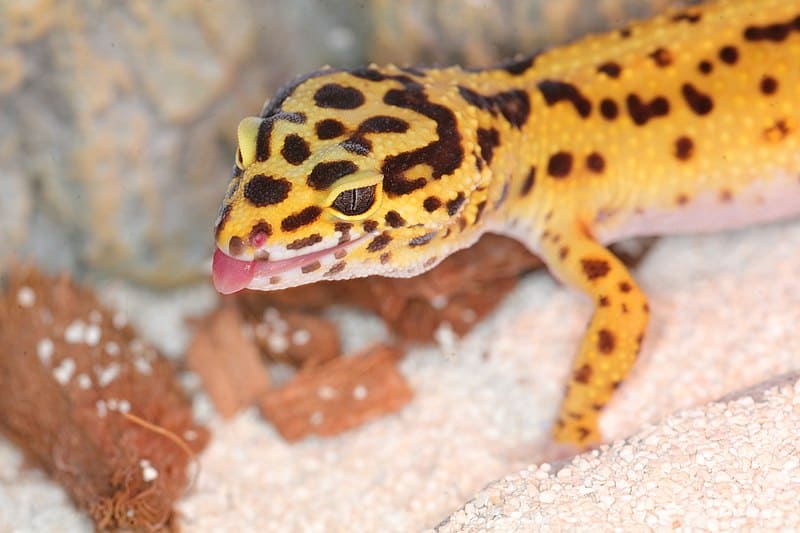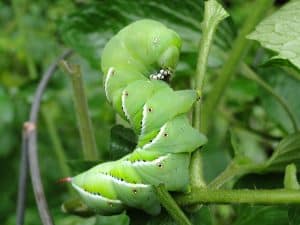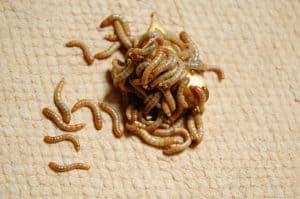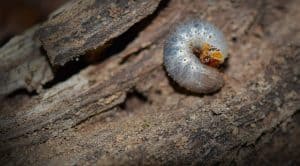Leopard Geckos are insectivore creatures and they thrive on a wide range of insects. It’s very important to keep their diet a bit varied and include numerous types of insects and worms io their meals. They love worms as both staple food and as snacks but you shouldn’t overfeed them on worms as they don’t contain all the nutrients your Leo needs.
In this article, we’ll talk about what a Leopard Gecko’s diet looks like and what types of worms you can feed them.
Can Leopard Geckos Eat Worms? What Types?

Generally, Leopard Geckos aren’t very picky eaters, but some might still avoid a few types of insects simply because they don’t like them. So at the end of the day, it all depends on what your little pet likes and what it can do without.
The first rule of feeding any gecko is to make sure the size of the feeder insects is NOT bigger than the size between the gecko’s eyes. This way, you can be 100% sure that the gecko can safely swallow the food without any complications.
Another thing you need to keep in mind is that Leopard Geckos tend to not even touch an insect if it’s already dead. Some geckos might not be bothered by it but they’re quite rare. Generally, the gecko would rather not eat at all than eat the dead insect. Specialists think that it’s because dead insects to them are like a spoiled meal to us.
No matter what type of worms your Leopard Geckos likes, make sure you can keep them alive long enough for your pet to eat them. If you can’t, then don’t risk it. If you’re close to a supplier, you can just get smaller quantities. But if not, then stick to other insects as a staple food and use a few worms a week as snacks for your gecko.
Hornworms

Leopard Geckos can eat hornworms as an occasional snack, as long as they don’t eat more than 2 per week. These worms are low in protein but luckily they’re also low in fat and easy to digest. This makes them some of the better worms to feed a gecko.
They’re also great for sick or dehydrated geckos as they’re pretty high in water content.
Earthworms
Earthworms are a pretty good food source for Leopard Geckos. But the problem arises when you need to find a good supplier. You should never feed your gecko wild earthworms as they carry lots of parasites.
And you need to avoid bait stores as well. Their earthworms are often coated in sawdust, powdered oatmeal, vegetable materials, pesticides, etc. All of these can hurt your Leopard Gecko.
Wax Worms
Leopard Geckos find waxworms extremely delicious but you need to avoid feeding them more than one or two per week. This is because they’re quite high in fat and can cause obesity in geckos.
On top of that, these worms are known to cause addiction and some geckos will refuse any other type of food once they get used to waxworms.
Superworms
Superworms are a bit of a difficult topic. Some geckos can eat them without any problems. But you should still feed them only a few worms a week as they’re high in fat as well. But other geckos can find them very hard to digest.
Some Leopard Geckos have vomited and had some internal damage from eating superworms. This is why it might be better to just avoid them if you’re not 100% sure your pet can eat them. And if your Leopard Geckos refuses them, be sure that it’s for a good reason and avoid trying again.
Mealworms & Their Pupa
 Mealworms are the go-to staple food for many geckos. They’re very well balanced in protein and not high in fat. They also don’t move, bite, or make any noise, which makes them easy to eat by sick geckos as well.
Mealworms are the go-to staple food for many geckos. They’re very well balanced in protein and not high in fat. They also don’t move, bite, or make any noise, which makes them easy to eat by sick geckos as well.
The rule of thumb in feeding mealworms to a gecko is to offer two mealworms per every inch of the pet’s total length.
Nightcrawlers
Nightcrawlers can be fed from time to time in an attempt to make the diet more varied. Other than that, they’re not really recommended since they don’t contain enough nutrients. They’re safe and won’t hurt the gecko but there are better insects to choose from.
Calci Worms
Calci Worms are one of the fanciest foods for geckos. They are known to be quite expensive and you might have trouble sourcing them from time to time. There are also a few geckos that don’t like them so your gecko refusing them is not a problem.
But when it comes to nutrients and fat, these worms overdo it. They’re very high in calcium, fat, protein, and they can only be fed around three calci worms a week.
Red Worms
Nutritionally speaking, Red Worms are quite low in fat and moderate in protein, which makes them OK for Leopard Geckos. But geckos are not typically very interested in them. Some will even avoid eating them no matter how much you’re insisting.
But if your Leopard Gecko loves them, make sure you’re getting them from a reputable supplier.
Grub Worms

Grub Worms are perfectly safe for Leopard Geckos as long as you’re not taking them from your own garden. These contain lots of parasites that can pass to the gecko and get it very sick. If you have a good supplier then they’re completely OK.
You should also make sure the worms are not very large. Otherwise, the geckos can choose while eating them.
Morio Worms
Morio Worms is a difficult topic as well. For once, they are high in fat and should only be fed as an occasional snack. And two, they can be quite dangerous as they have very strong jaws and will occasionally bite the gecko from the inside.
Leopard Geckos prefer live food. The more active the insect is, the better. But a Morio Worm should only be fed after you cut its head so it won’t hurt the gecko. And this makes them uneatable to most Leopard Geckos.
Should Leopard Geckos Eat Just Worms?
There are various types of worms and they all have different nutritional values. Some are also much higher in fat than others. However, no matter what type of worms you combine, you won’t be able to provide all the nutrients your gecko needs to lead a happy and healthy life.
You shouldn’t try just to keep the gecko alive. You should strive to offer all the nutrients its body needs every day and the best environment you can afford. They might be small creatures, but they still have their own needs to remain healthy, happy, and docile. A hungry gecko that feels trapped in a small cage will become very destructive and turn the whole enclosure upside down.
Feeding your Leopard Geckos the wrong worms can cause them to become malnourished and lose some of their strength. And if you’re feeding them too many worms that are high in fat, they will actually gain weight. This will be hard as these geckos store their fat in their tails.
But if a Leopard Gecko’s tummy isn’t flat (not after a meal), you might have to cut back some of the insects that are high in fat. Rethink their whole meal plan and see when you are feeding them a bit too many fatty snacks and cut back from there. Typically, butterworms and other similar worms are the cause.
This being said, a Leopard Gecko can actually live on a diet of worms if there are some other insects introduced from time to time as well. Mealworms are a perfect staple food for them and they are often combined with crickets. But keeping your gecko only on mealworms as long as the snacks are other insects can also be OK.
But you have to be an experienced keeper to be able to keep a Leopard Gecko healthy on a diet of worms. This is because there can be cases where the gecko can react badly to only eating worms and you need to see the signs before it’s too late.
Feeding a gecko nothing but mealworms can be very easy for you, but you need to think past your convenience and see if the diet agrees with your Leopard Gecko. Talk with your exotic vet and follow the instructions to ensure a healthy lifestyle for your cute little pet.
What does a healthy diet look like, for a Leopard Gecko
A healthy diet for a Leopard Gecko needs to include a few different types of insects. And while crickets and mealworms are typically the best insects, you can also feed them beetles, sowbugs, cockroaches, tomato hornworms, silk worms, butterworms, waxworms, etc.
As a staple food, you should consider crickets or mealworms, or a mix between the two and another insect each meal. Beetles and cockroaches are a great addition to ensure a varied diet. But waxworms and superworms should never be fed as staple food. Two or three worms a week is more than enough, or the gecko might start to gain a lot of weight.
One worm you should be very careful about is the butterworm. It contains bad calcium and it can be pretty high in fat as well. And while you can still use it as an occasional snack, it’s best if you just avoid it entirely. This is because some geckos can actually get addicted to them. This can lead to them refusing any other food until they’re almost starving.
Crickets are very well known as feeder insects for geckos. They’re high in protein and low in fat, which makes them perfect for a very wide range of lizards. More than that, they’re also available almost anywhere, they’re easy to digest, and are active creatures, which helps increase a feeding response in your gecko.
The disadvantages of keeping crickets are the smell, the noise, and their expertise in escaping their enclosure. There’s nothing more annoying than losing a few crickets around the house and hear them vocalizing the entire night. That’s when you truly realize how loud these insects can actually be.
When it comes to mealworms, they are especially great for special needs geckos. All you have to do is place them in a tray and let the gecko eat at its pace. They make absolutely no noise and they don’t typically have any odor. And if you get them in bulk, you can simply refrigerate them to keep them fresh for longer. They won’t die, they will just become inactive and won’t need water or food.
But mealworms are also nowhere near as nutritionally complete as crickets. More than that, their exoskeleton is harder to digest. And if they happen to escape from the feeding dish inside the enclosure, they will burrow and they can be hard to dig out.
Another thing you should keep in mind is that geckos love to hunt their prey. This means that the more active the insect is, the more interested the gecko is in eating it. And since these worms are not very active, some geckos might not want to bother with them.
How often does a Leopard Gecko need to eat?
Feeding a Leopard Gecko depends on how old and in what state it is. If it’s just a hatchling and isn’t even 6 months old yet, you will have to prepare for quite a bit of babying every day. You will have to prepare up to three meals each day and make sure the insects are very small and easy to digest.
If your gecko is still a hatchling, avoid buying feeder insects in bulks. They will grow in size way too fast and your gecko won’t be able to eat them any longer. Until your pet is at least one year old, get used to buying smaller quantities. Geckos that are between 6 months and 1-year-old need to be fed once a day.
Once your gecko becomes an adult, you can reduce the meals and feed it around 3 times a week. You need to choose a feeding time in the evening as that’s when the Leopard Geckos are most likely to go out and hunt. And if yours is a picky eater, feed it normally but leave a few worms in a dish overnight in case it changes its mind.
And if your gecko is sick and needs to recover, it will need to eat daily as well. Make sure the portions are smaller and don’t feed any insects that could hurt the gecko or escape around the enclosure.